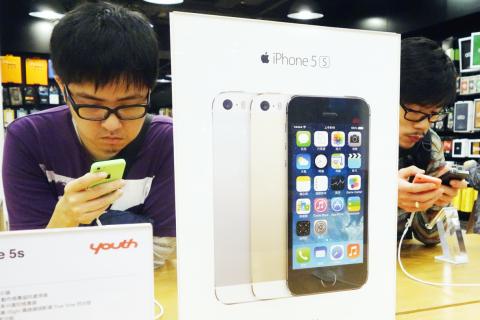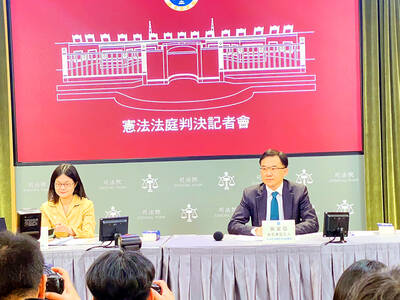The Fair Trade Commission (FTC) yesterday fined Apple Asia Ltd NT$20 million (US$666,220) for restricting local telecommunications companies to set their sale prices of iPhones — a move that inhibits competition.
“The commission’s ruling makes Taiwan the first country to fine Apple Inc’s subsidiaries concerning their handset distributors’ pricing, while there is a similar ongoing investigation concerning Apple Inc for impeding competition in Europe,” Fair Trade Commission Vice Chairman Sun Lih-chyun (孫立群) said.
Apple Asia Inc has to stop the practice immediately once the company receives official documentation from the government, otherwise the company may be subject to another fine of NT$100,000 up to NT$50 million, Sun said.

Photo: Lo Pei-der, Taipei Times
“If Apple Asia hired local companies to provide services and sell iPhones, the company can set prices for them,” Sun said. “However, based on the contracts between Apple and their handset distributors, the company actually sold its iPhones to local companies, therefore local companies should have the right to set prices themselves.”
According to Sun, Apple Asia violated Article 18 of the Fair Trade Act (公平交易法), which states that when an enterprise supplies goods to its trading counterparts for resale to a third party, the trading counterparts shall “be allowed to decide their resale prices freely.”
The contracts between Apple Asia and Chunghwa Telecom Co (中華電信), Taiwan Mobile Co (台灣大哥大) and Far EasTone Telecommunications Co (遠傳電信) showed that Apple Asia demanded the three companies to send their iPhone pricing plans for its review, Sun said.
In e-mails between high-ranking officials of the companies, the commission also found evidence that Apple Asia required local companies to adjust plans they proposed concerning the prices for iPhones, the subsidies they offer for iPhones with contracts, and the price difference between the iPhone 4S and the iPhone 5, he said.
The contracts between Apple Asia and the three local companies also stipulated that the conditions they set for buying iPhones, such as subsidies these companies offer for buying iPhones with contracts, cannot be lower than those of their competitors, Sun said.
The three local companies also needed to submit their promotion plans for iPhones for the approval and confirmation of Apple Asia, he added.
Sun said the commission investigated three other smartphone makers, HTC Corp (宏達電), Sony Corp and Samsung Electronics Taiwan, but none of them has reached similar contracts with local service providers.
The three companies account for 80 percent of the local market for telecommunication services, Sun said, adding that 90 percent of iPhones sold in Taiwan are from the three companies, with most of the headsets sold with contracts.
Sales of iPhones in Taiwan account for 1 percent of iPhones sold by Apple Inc around the world, Sun said.
The commission established the case in April this year when FTC Chairman Wu Shiow-Ming (吳秀明) was urged by legislators to investigate why all local mobile service providers had set the same prices for iPhones, Sun said.

TRAGEDY STRIKES TAIPEI: The suspect died after falling off a building after he threw smoke grenades into Taipei Main Station and went on a killing spree in Zhongshan A 27-year-old suspect allegedly threw smoke grenades in Taipei Main Station and then proceeded to Zhongshan MRT Station in a random killing spree that resulted in the death of the suspect and two other civilians, and seven injured, including one in critical condition, as of press time last night. The suspect, identified as a man surnamed Chang Wen (張文), allegedly began the attack at Taipei Main Station, the Taipei Fire Department said, adding that it received a report at 5:24pm that smoke grenades had been thrown in the station. One man in his 50s was rushed to hospital after a cardiac arrest

PUBLIC SAFETY: The premier said that security would be tightened in transport hubs, while President Lai commended the public for their bravery The government is to deploy more police, including rapid response units, in crowded public areas to ensure a swift response to any threats, President William Lai (賴清德) said yesterday after a knife attack killed three people and injured 11 in Taipei the previous day. Lai made the remarks following a briefing by the National Police Agency on the progress of the investigation, saying that the attack underscored the importance of cooperation in public security between the central and local governments. The attack unfolded in the early evening on Friday around Taipei Main Station’s M7 exit and later near the Taipei MRT’s Zhongshan

ON ALERT: Taiwan’s partners would issue warnings if China attempted to use Interpol to target Taiwanese, and the global body has mechanisms to prevent it, an official said China has stationed two to four people specializing in Taiwan affairs at its embassies in several democratic countries to monitor and harass Taiwanese, actions that the host nations would not tolerate, National Security Bureau (NSB) Director-General Tsai Ming-yen (蔡明彥) said yesterday. Tsai made the comments at a meeting of the legislature’s Foreign Affairs and National Defense Committee, which asked him and Minister of National Defense Wellington Koo (顧立雄) to report on potential conflicts in the Taiwan Strait and military preparedness. Democratic Progressive Party (DPP) Legislator Michelle Lin (林楚茵) expressed concern that Beijing has posted personnel from China’s Taiwan Affairs Office to its

‘ILLEGAL RULING’: The KMT and the TPP slammed the Constitutional Court judgement, saying it contravened the law and was trying to clear the way for a ‘green dictatorship’ The Constitutional Court yesterday ruled that amendments to the Constitutional Court Procedure Act (憲法訴訟法) passed by the Legislative Yuan last year are unconstitutional, as they contravene due legislative process and separation of powers. The Legislative Yuan on Dec. 20 last year passed amendments stipulating that no fewer than 10 grand justices must take part in deliberations of the Constitutional Court, and at least nine grand justices must agree to declare a law unconstitutional. The Executive Yuan on Jan. 2 requested that lawmakers reconsider the bill, but the Legislative Yuan, under a combined majority of Chinese Nationalist Party (KMT) and Taiwan People’s Party